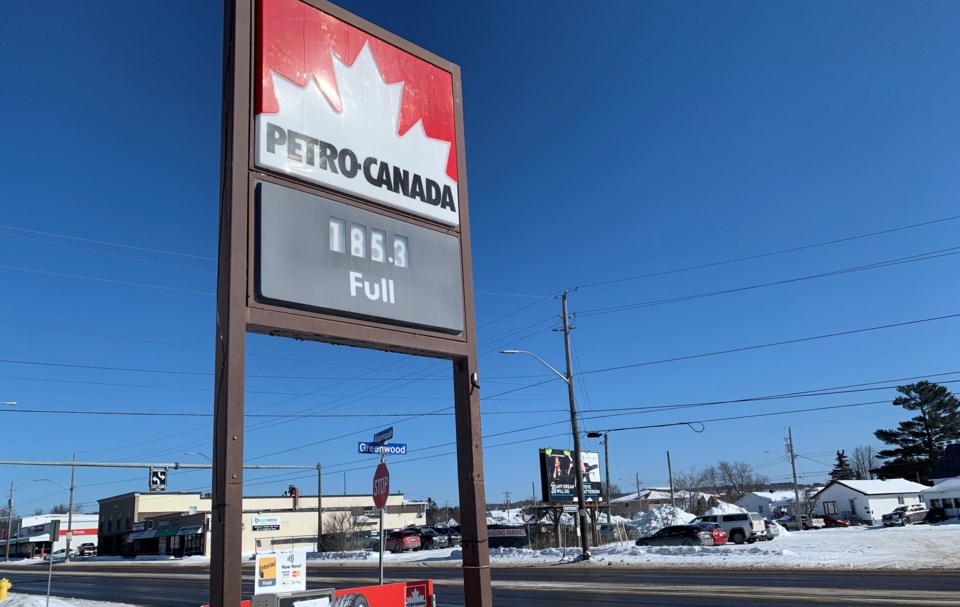If you think gas prices are high right now, just wait, says the president of Canadians for Affordable Energy.
Dan McTeague is the creator and owner of the website gaswizard.ca, which predicts fuel prices across the country. Prices at most gas stations in North Bay spiked to 199.9 Tuesday. In just a week, gas prices have risen have about 30 cents per litre. At the beginning of the month, prices were at around 168.0.
McTeague said the cost of gasoline will “inevitably” go up across the province by an average of six cents per litre by Friday, which means motorists will be paying about $2.03.9 a litre.
“This is the highest price you've ever paid for gasoline, period, bar none, and make no mistake, it's not going to get any better anytime soon,” said McTeague. “You're going to be $2.03 a litre Thursday. It's rather inevitable. The gas stations there are keeping 20-cent retail margins (in the North) versus eight cents in Toronto. So a difference of 12 cents a litre, you can pretty much see what's happening here.”
At the start of 2022, gas prices in Ontario were, on average, $1.40 a litre. Now, they are upwards of $1.90. That’s more than 50 cents in three months.
The main factor affecting gasoline prices right now is Russia’s invasion of Ukraine, he said. But the price of oil is set by the New York market.
“That’s the benchmark for all fuel prices,” McTeague said.
Traders come in and say, “What do they think the price of oil and diesel and gasoline and natural gas will be,” and then they form a price that makes the futures price for several days ahead, McTeague said.
“On Tuesday, for instance, oil went up from where it was on Monday from $119 a barrel to $123 a barrel,” said McTeague
Gasoline and the wholesale market in the US went from $3.43 a gallon to $3.55 a gallon, a 12-cent-a-gallon increase, McTeague said. When you multiply that by a weakening Canadian dollar, which also lost ground Tuesday, it shows a net increase of 5.2 cents a litre plus HST, and “Bob's your uncle, it means a six-cent increase coming Thursday,” he said.
Sudburians can look forward to Costco setting up its own gas station in that city in July. He said he expects gas prices to drop seven or eight cents a litre right away. But that won't help North Bay mototists who are already flocking to First Nation gas stations on Highway 17 west.
McTeague said if Russia were to cease its invasion of Ukraine, it would see gas prices dropping in the order of at least 20 to 25 cents a litre, he said.
“So pray for that to happen,” he said. “But a lot of the money motorists would save there would be taken back by the federal government's insistence on increasing carbon taxes on April 1 following an increase on Dec. 1 last year.”
Unfortunately, for the next couple of weeks, gas prices will continue to go up dramatically, and they're going to hit us pretty hard.”
Regulating prices, as the NDP continues to push for, won’t work, he said.
“Regulation is just a little comfy blanket for most, it gives people the false impression that somehow it can change things,” said McTeague. “It doesn't work.”
McTeague remains adamant that the most effective way to keep fuel prices low is to build the pipelines.
“You want to bring down fuel prices in Canada? Build a pipeline. Stop blocking them. If you stop blocking pipelines, the Canadian dollar will increase its value. It'll go from 120 pennies to buy one US dollar to $1 even. You'll save 25 cents a litre right from the get-go.”
The last time oil was at $100 a barrel, the Canadian dollar was trading at par, he said.
The reason the Canadian dollar is weak right now is that there’s nothing to buy in this country, other than real estate, said McTeague.
“We're not attracting a lot of capital into investments to produce oil, because even though we could produce it, we can't deliver it,” said McTeague. “So blocking pipelines has a cost.”



